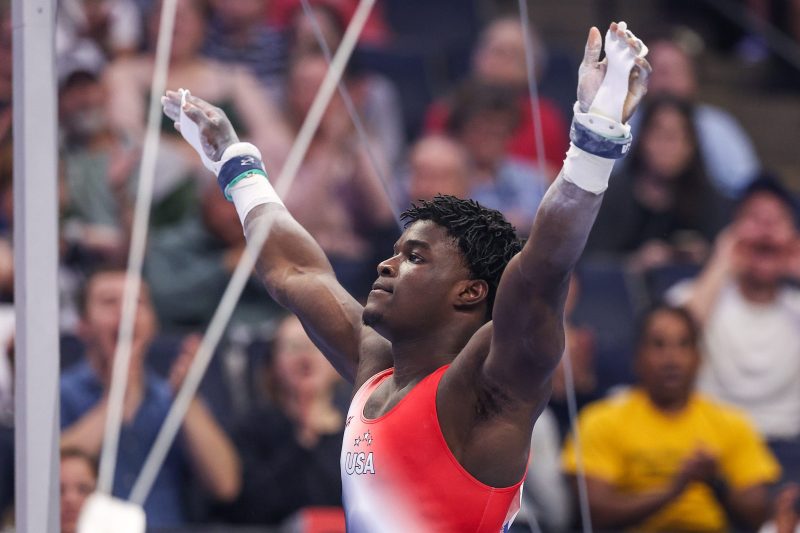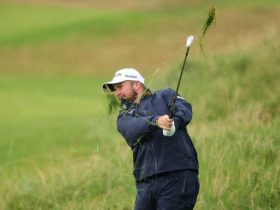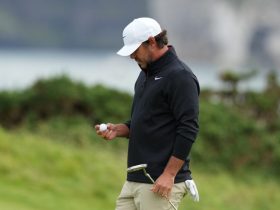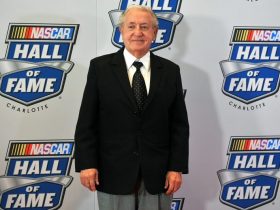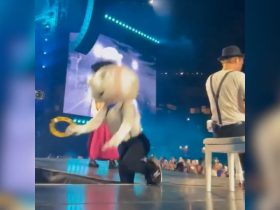Frederick Richard has big goals in mind when men’s gymnastics begins at the Paris Olympics later this summer. Winning a gold medal or two − something no American male has done in the sport since Paul Hamm in 2004 − is just the start.
‘I want to be that Michael Jordan of gymnastics,’ Richard told USA TODAY in a June interview. ‘The one that changes it when he leaves and makes it 20 times as big and respected. And that’s one of the big goals that I have, and I’ll be in the sport for another 10 years. Every day that’s what I really go after. It’s not one competition or a certain amount of medals. It’s really changing the sport.’
Last October, Richard joined an exclusive group of American male gymnasts when he won a bronze medal in the all-around at the world championships.
Get Olympics updates in your texts! Join USA TODAY Sports’ WhatsApp Channel
He became the first American male to medal in the all-around at worlds since 2010, he helped the U.S. win its first team medal, also a bronze, since 2014, and he’s one of the team’s top medal contenders in Paris.
Meet Team USA: See which athletes made the U.S. Olympic team and where they are from
Just 20 years old, Richard is a rising star in the gymnastics world and on social media, where he’s known to his nearly 1 million followers across Instagram and TikTok as ‘Frederick Flips.’
He stumbled into his social media presence during the COVID pandemic, saw immediately how it could help grow his brand and the sport − he got about 300 views on his first TikTok video, before he had any followers or the benefit of being an All-American college gymnast at Michigan − and has used it to express his personality, creativity and competitiveness since.
‘I guess where I see my role being, at least while I’m in gymnastics is two areas,’ Richard said. ‘One, of course, is dominating. I have to do what no one’s ever done. I have to do things that people realize they didn’t think was possible and I stand for that ability of being able to push the limits of what was possible. And then No. 2 is getting as many eyes as possible on the sport. The more eyes I can bring to the sport, the more people I can get to kind of learn the story and eventually fall in love with the sport the way they do with other sports.’
How Fred Richard got started in gymnastics
For Richard, gymnastics has been a lifelong love and the only sport he’s ever competed in.
He took his first gymnastics class at a gym walking distance from his Stoughton, Mass., home when he was 4, but was a regular on the mat before that, tumbling enthusiastically across the floor as his older sister, Lexi, shyly clung to her mother’s skirt, not wanting to leave her side to take part in class.
Ann-Marie Richard recalls her son doing handstands in his crib with a pacifier in his mouth, ‘just there, upside down’ in ‘his happy place,’ and doing straddle Ls on her bedposts a few years later. When he was 4 or 5, Frederick would scale a doorway in his home and flip through the tiny space between the door’s molding and his father’s Iron Gym pull-up bar.
‘He was always a little daredevil from since he was a baby,’ Ann-Marie Richard said. ‘We had to constantly look at him because we were just afraid he was going to kill himself. Literally. And he has fallen on his head a couple of times jumping up and down on my bed, flipping and then would land on the floor and I would get all frantic yelling, cause I’m like, ‘Oh my god, the cops are going to pick me up for this child.’ It was crazy.
‘And then at one point, my husband and I said, when he started doing it in gymnastics we said, ‘Great, this is an outlet. It’s a safe place to do it, cause he’s going to do it either way. He’s going to do it at home, so we might as well just put him in early.”
Richard was as much a product of his own fearlessness and hard work as he was a gymnastics prodigy.
When he was about 8 years old, Richard told his then-coach, Tom Fontecchio, the kids his age weren’t serious enough about gymnastics and he wanted to work with the older boys. He skipped family vacations, including at least one trip to Disney, to stay and train or compete in meets.
And when he scored just high enough to secure a spot in USA Gymnastics’ Future Stars Program for the first time, tying for eighth place in a program that put the top eight finishers on a path for the junior national team, it stoked his passion to be the best.
‘My whole mindset changed of like, ‘Wow, I’m eighth? All these kids are better than me? I want to be better than them,’’ Richard said. ‘So from there, you kind of have that wakeup call of seeing kids across the country and how good they are and seeing where you could be, and from there I just started pushing harder and harder and climbing the ladder.’
Growing up being among the few Black kids in gymnastics
Through all his travels, two things stood out to Richard: The miniscule crowds that showed up to watch men’s gymnastics, especially when compared to their women counterparts, and how few Black males there were competing in the sport at all levels.
‘You grow up in the gym and there’s, if you’re lucky enough, three Black kids in the gym out of hundreds, and it’s weird,’ Richard said. ‘You’re a kid and you already feel out of place, and you’re growing up with kids have lots of questions, kids go through a period of experimenting, learning new words, learning what racism is, learning what stereotypes are, learning all this stuff and you’re that person that it all goes towards because you’re the odd one out.
‘I did have a lot of support of gymnasts very close to me as best friends and coaches and it’s not like it was some terrible racist system. It was a great childhood, but when you feel out of place you want to look up to somebody like you who looks like you, but there wasn’t really anybody winning these medals in the Olympics. So now I feel like that’s an opportunity I have while I’m here to make those other kids feel comfortable.’
Around the time Frederick was 12 or 13, Ann-Marie said he realized how powerful the U.S. women’s team was and how the men’s team struggled to medal in international competitions, and vowed to change it.
He took an online marketing class with future designs of growing his brand and the sport. He got practical experience in the marketing field, starting a roofing company in conjunction with his father’s construction business and going door-to-door to drum up business. And after missing a season of gymnastics with a stress fracture in the L4 vertebrae in his lower back − an injury that relegated him to a full torso brace for a period of time − he returned better than ever to competition.
Richard won the junior division all-around competition as well as the floor exercise, vault and high bar at the 2021 U.S. Gymnastics Championships. He won five golds at the Junior Pan American Championships in Brazil in 2022; Fontecchio had promised to loan Richard his Fiat roadster sports car for a week if he won four golds at the event. And after winning NCAA titles in the high bar, parallel bars and all-around as a freshman at Michigan in 2023, he won the U.S. Olympic trials in June, finishing in the top three in floor exercise, parallel bars and high bar.
As his profile as a gymnast grew, so did Richard’s presence on social media.
He used his entire $1,500-a-month U.S. national team stipend to hire two friends from his dorm at Michigan to help create and publish content on Instagram and TikTok. He dreamed up friendly athletic competitions against other Michigan athletes, and posted one video − a front flip challenge between him and teammate Sam Kaplan − that he said generated more than 20 million views across all his social media accounts.
Richard said he’s heard directly or indirectly from countless young athletes who said he was the reason they started or were sticking with gymnastics. And at the NCAA championships this year, one fan saluted with him with a sign that said he drove several hundred miles to watch ‘Frederick Flips’ compete.
Known for his power and athleticism in competition − Richard does five high-level release skills on the high bar, and Fontecchio said he ‘has probably the highest difficulty in the United States at all the events’ − Richard has become more technical in his two seasons at Michigan, refining his lines and sharpening his mental approach.
But to reach his lofty goals −dramatically growing the fan base of men’s gymnastics and ushering in a new wave of minority talent − he knows there is more to do.
After the Olympics, Richard will join Simone Biles on her Gold Over America Tour, a performance gymnastic event scheduled for 30 stops in just over six weeks. By the 2028 Games in Los Angeles, Richard said he hopes to master several new moves he’s in the process of creating across multiple events; one he’s currently working on is bringing the breakdancing-inspired air flare he does in his floor routine to the pommel horse.
And in Paris, he plans to pile up medals while stamping himself as the new face of the sport.
‘I think it’s more of an opportunity,’ Richard said. ‘I’ve chosen to take the role on and I’ll gladly take it with whatever risks come. But if I failed – I guess pressure comes from if you’re fearing what happens if you don’t do it. And if I would fail, the sport would be exactly where it is right now, so it’s like, there’s only opportunity to move it in the right direction.’
Contact Dave Birkett at dbirkett@freepress.com. Follow him on X and Instagram at @davebirkett.

